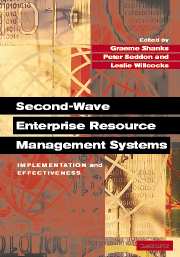Book contents
- Frontmatter
- Contents
- List of Contributors
- Introduction: ERP – The Quiet Revolution?
- Part I Implementation and Effectiveness: Overview
- Part II From Risks to Critical Success Factors
- Part III From Learning to Knowledge
- 10 Implementing Enterprise Resource Planning Systems: The Role of Learning from Failure
- 11 ERP Projects: Good or Bad for SMEs?
- 12 The Role of the CIO and IT Functions in ERP
- 13 Enterprise System Management with Reference Process Models
- 14 An ERP Implementation Case Study from a Knowledge Transfer Perspective
- 15 Knowledge Integration Processes within the Context of Enterprise Resource Planning System Implementation
- Part IV Cultural Aspects of Enterprise Systems
- Part V Future Directions
- Index
- References
11 - ERP Projects: Good or Bad for SMEs?
from Part III - From Learning to Knowledge
Published online by Cambridge University Press: 05 February 2012
- Frontmatter
- Contents
- List of Contributors
- Introduction: ERP – The Quiet Revolution?
- Part I Implementation and Effectiveness: Overview
- Part II From Risks to Critical Success Factors
- Part III From Learning to Knowledge
- 10 Implementing Enterprise Resource Planning Systems: The Role of Learning from Failure
- 11 ERP Projects: Good or Bad for SMEs?
- 12 The Role of the CIO and IT Functions in ERP
- 13 Enterprise System Management with Reference Process Models
- 14 An ERP Implementation Case Study from a Knowledge Transfer Perspective
- 15 Knowledge Integration Processes within the Context of Enterprise Resource Planning System Implementation
- Part IV Cultural Aspects of Enterprise Systems
- Part V Future Directions
- Index
- References
Summary
Introduction
The enterprise resource planning (ERP) movement has been gathering momentum for the best part of ten years and has now reached a global dimension, with companies across the world and, more importantly, across very different industries jumping on the ERP band wagon. The pace of implementations has been such that SAP have posted on their web site the news that they have now implemented their software in 30,000 sites and have a user population of 10 million. This gives an idea of the scale and pace of the whole ERP movement.
ERP systems are integrated enterprise-wide software packages that use a modular structure to support a broad spectrum of key operational areas of the organization. They are widely acknowledged as having the potential to radically change existing businesses by bringing improvements in efficiency and the implementation of optimized business processes (Rowe, 1999). The key reasons why managers have sought to proceed with difficult ERP projects have been reported to be to end the fragmentation of current systems, to allow a process of standardization, to give more visibility on data across the entire corporation, and, in some cases, to obtain competitive advantage. Thus, ERP projects have been described as strategic projects whose success or failure will have a great impact on the organization (Rowe, 1999; Shakir, 2000; Wood and Caldas, 2000).
- Type
- Chapter
- Information
- Second-Wave Enterprise Resource Planning SystemsImplementing for Effectiveness, pp. 275 - 298Publisher: Cambridge University PressPrint publication year: 2003
References
- 8
- Cited by

